YM 3.1 - Equal Opportunities
First airtime BBC: 11 November 1982
Length: 30 minutes
| Cast | Crew | |||
| Jim Hacker MP | Paul Eddington | Assistant floor manager | Lydia Frankenburg | |
| Sir Humphrey Appleby | Nigel Hawthorne | Studio lighting | John Dixon | |
| Bernard Woolley | Derek Fowlds | Costume designer | Judy Allen | |
| Sir Arnold Robinson | John Nettleton | Make-up artist | Toni Chapman | |
| Annie Hacker | Diana Hoddinott | Video tape editor | Dave Rixon | |
| Sarah Harrison | Eleanor Bron | Vision mixer | Bill Morton | |
| Schoolpaper girl | Talla Hayes | Studio sound | Malcolm Johnson | |
| Permanent Secretary Home Office | Richard Simpson | Music | Ronnie Hazlehurst | |
| Permanent Secretary FCO | Peter Howell | Title sequence | Gerald Scarfe | |
| Permanent Secretary MOD | Jeffrey Segal | Production assistant | Lesley Langan | |
| Permanent Secretary DHSS | Donald Pelmear | Production manager | Brian Jones | |
| Designer | Gary Pritchard | |||
| Producer | Peter Whitmore | |||
| Writers | Antony Jay & Jonathan Lynn | |||
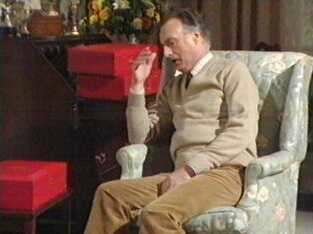 Plot: Jim Hacker is being interviewed by a school girl who asks what he has actually achieved. He realises that he actually has not achieved anything important since he became Minister.
Plot: Jim Hacker is being interviewed by a school girl who asks what he has actually achieved. He realises that he actually has not achieved anything important since he became Minister.
His wife Annie suggests to concentrate on achieving at least one thing while he is Minister. She suggests he should do something about the low number of women in the higher ranks of the Civil Service. Jim Hacker decides to go for this because there is a principle at stake; and principles are excellent vote winners.
The next day at the office he asks Sarah Harrison, an attractive Undersecretary, about the number of women in the Civil Service. He learns that very few women have made it to the top of the Civil Service.
He shares this information with Sir Humphrey and tells him he wants to institute a 25% quota of women, to be achieved in four years time, by attracting women from outside the Civil Service. Sir Humphrey is of course appalled by this idea of getting people from outside the Service for the top 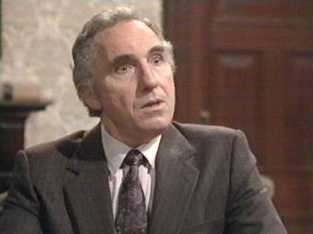 jobs, let alone women. He argues that this policy requires a larger intake of women at the recruitment for junior positions, and after 25 years or so the quota could be met.
jobs, let alone women. He argues that this policy requires a larger intake of women at the recruitment for junior positions, and after 25 years or so the quota could be met.
Jim Hacker however wants to start right away by mobilizing his Cabinet colleagues on this issue, and by promoting Sarah Harrison to Deputy Secretary within the DAA. Sir Humphrey disagrees with this appointment, since she is the most junior Undersecretary and it is therefore not her turn. Their discussion ends in a stalemate.
Sir Humphrey is a bit worried about his Minister's plan and therefore has a chat with Sir Arnold. Sir Arnold suggest to tell the Minister the unions won't agree to this. Furthermore he will make sure all Permanent Secretaries will persuade their Ministers not to go along with this ridiculous plan.
Back at the office Sir Humphrey tells Jim Hacker the unions will not go along with this quota idea, but this argument is not effective. Jim Hacker realises that Sir Humphrey just wants to drop the whole scheme.
When Annie Hacker arrives at the office, Sir Humphrey has a little chat with her about how 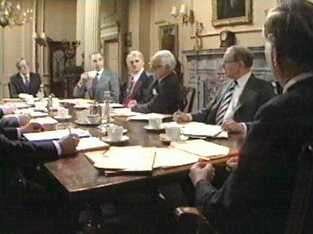 attractive Sarah Harrison is and that Jim will spend much more time with her when she is promoted to Deputy Secretary. This surely makes Annie think twice about this women's quota idea.
attractive Sarah Harrison is and that Jim will spend much more time with her when she is promoted to Deputy Secretary. This surely makes Annie think twice about this women's quota idea.
At a meeting of all the Permanent Secretaries the quota is discussed. As it turns out everyone fully agrees in principle, but does not see how it could be instigated within their own departments. And this is the same what happens at the Cabinet meeting of all the Ministers; every Minister applauds the principle but then says it would not work in their department.
Jim Hacker is very disappointed by this outcome and he decides to at least appoint Sarah Harrison to Deputy Secretary, even though his wife seems to be against it now. When he tells Sarah about this wonderful promotion, she tells him she was just about to resign from the Civil Service. She explains Jim Hacker that she wants a job that will appreciate her as a person and where she personally can achieve things, and therefore has accepted a job at a merchant bank. She is absolutely not charmed by the fact that she would be part of a 25% quota and does not appreciate being patronized. Jim Hacker is very disappointed and all he can say is: "Women!".
Rating (0-10): 7
Top 5 Quotes:
 [Talking about the reasons for leaving the Civil Service]
[Talking about the reasons for leaving the Civil Service]
Sarah Harrison: "Well quite honestly, Minister, I want a job where I don't spend endless hours circulating information that isn't relevant, about subjects that don't matter to people who aren't interested. I want a job where there is achievement, rather than merely activity. I am tired of pushing paper. I want to be able to point to something and say: I did that."
Sir Humphrey: "I don't understand..."
Sarah Harrison: "I know. That's why I'm leaving."
Jim Hacker: "Surely you're not saying that the government of Britain is unimportant?"
Sarah Harrison: "No, it's very important. It's just that I haven't met anyone who is doing it." Jim Hacker: "I have made a policy decision. I am going to do something about the number of women in the Civil Service."
Jim Hacker: "I have made a policy decision. I am going to do something about the number of women in the Civil Service."
Sir Humphrey: "Surely there aren't all that many?" Sir Humphrey: "Well, if I might suggest that we be realistic about this."
Sir Humphrey: "Well, if I might suggest that we be realistic about this."
Jim Hacker: "By realistic you mean drop the whole scheme?"
Sir Humphrey: "Dear me, no. But perhaps a pause to regroup, a lull in which to reassess the situation and discuss alternative strategies, a space of time for mature reflection and deliberation."
Jim Hacker: "Yes, you mean drop the whole scheme." Sir Humphrey: "We must, in my view, always have the right to promote the best man for the job, regardless of sex."
Sir Humphrey: "We must, in my view, always have the right to promote the best man for the job, regardless of sex." Jim Hacker: "That is the last interview I give for a school magazine; she asked some very difficult questions."
Jim Hacker: "That is the last interview I give for a school magazine; she asked some very difficult questions."
Annie Hacker: "Not difficult, just innocent. She was assuming there was some moral basis to your activities."
Jim Hacker: "Well, there is."
Annie Hacker: "Oh Jim, don't be silly."
YM 3.2 - The Challenge
First airtime BBC: 18 November 1982
Length: 30 minutes
| Cast | Crew | |||
| Jim Hacker MP | Paul Eddington | Properties buyer | Bob Sutton | |
| Sir Humphrey Appleby | Nigel Hawthorne | Assistant floor manager | Lydia Frankenburg | |
| Bernard Woolley | Derek Fowlds | Studio lighting | John Dixon | |
| Sir Arnold Robinson | John Nettleton | Costume designer | Judy Allen | |
| Dr. Cartwright | Ian Lavender | Make-up artist | Toni Chapman | |
| Ben Stanley | Doug Fisher | Senior Cameraman | Peter Ware | |
| BBC CEO | Moray Watson | Video tape editor | Chris Wadsworth | |
| Permanent Secretary at lunch | Stuart Sherwin (?) | Vision mixer | Bill Morton | |
| Floor manager TV interview | Frank Tregear (?) | Studio sound | Malcolm Johnson | |
| Ludovic Kennedy | Ludovic Kennedy | Music | Ronnie Hazlehurst | |
| Title sequence | Gerald Scarfe | |||
| Production assistant | Lesley Langan | |||
| Production manager | Brian Jones | |||
| Designer | Andrée Welstead Hornby | |||
| Producer | Peter Whitmore | |||
| Writers | Antony Jay & Jonathan Lynn | |||
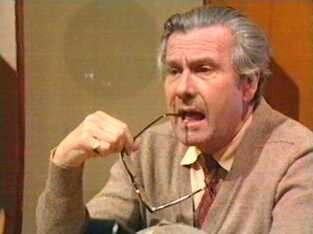 Plot: Jim Hacker has received new responsibilities after the Cabinet reshuffle. He now is also responsible for local government. Straight after the appointment at Number Ten he has a radio interview with Ludovic Kennedy. Ludovic asks Hacker how he will get a grip on local government since his predecessor did not succeed in this, but Hacker remains vague and just repeats that he sees this new job as an enormous challenge.
Plot: Jim Hacker has received new responsibilities after the Cabinet reshuffle. He now is also responsible for local government. Straight after the appointment at Number Ten he has a radio interview with Ludovic Kennedy. Ludovic asks Hacker how he will get a grip on local government since his predecessor did not succeed in this, but Hacker remains vague and just repeats that he sees this new job as an enormous challenge.
Sir Arnold has heard the radio interview of Jim Hacker and is worried that this means that Hacker actually wants to do something about reforming local government. At lunch with Sir Humphrey he expresses his concern and orders Humphrey to make sure nothing is done. This is important because every local government reform always leads to a reform in Whitehall as well. He advises Humphrey to let Hacker crack his teeth at Civil Defence (fall-out shelters), because this is not a serious issue.
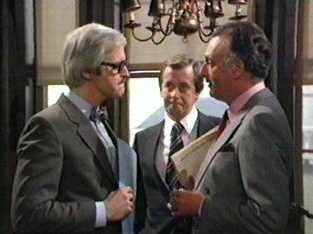 At the department Jim Hacker has a meeting with the Director of Local Administration Statistics Dr. Cartwright, who is now part of the DAA. He presents the Minister with a plan to introduce pre-set failure standards on all local government plans that cost more than 10,000 pounds. Jim Hacker is excited; this will make sure he gets a grip on local government. Sir Humphrey however is not pleased and he recommends the Minister first looks at a real vote-winning issue: Civil Defence. He points out that the London borough of Thames Marsh has spent the least of all boroughs on Civil Defence, and that a Ministerial visit may be a good idea.
At the department Jim Hacker has a meeting with the Director of Local Administration Statistics Dr. Cartwright, who is now part of the DAA. He presents the Minister with a plan to introduce pre-set failure standards on all local government plans that cost more than 10,000 pounds. Jim Hacker is excited; this will make sure he gets a grip on local government. Sir Humphrey however is not pleased and he recommends the Minister first looks at a real vote-winning issue: Civil Defence. He points out that the London borough of Thames Marsh has spent the least of all boroughs on Civil Defence, and that a Ministerial visit may be a good idea.
Jim Hacker visits Thames Marsh and has quite a bit of publicity success. He points out that the borough has only one fall-out shelter with a place in it reserved for the leader of the council, Mr. Ben Stanley. Sir Arnold is very pleased that Jim Hacker is looking at a non-issue like Civil Defence, but Sir Humphrey tells him that Hacker still wants to introduce the pre-set failure standards plan of Dr. Cartwright. When Sir Humphrey tells him that Hacker has a TV interview on Civil Defence the next day, Sir Arnold gets an idea how to block the plan.
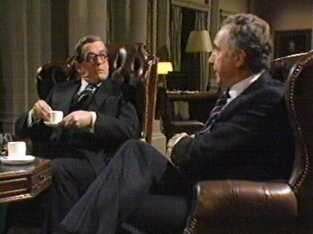 At the TV interview Jim Hacker talks enthusiastically about his victory at Thames Marsh and states that there are more important people like doctors and nurses that need to have places reserved in fall-out shelters. Then Jim Hacker gets in a bit of trouble when Ludovic Kennedy asks if this means that the Prime Minister and the Home Secretary should give up their reserved places. He gets out of it by telling the story of a borough that spent their entire Civil Defence budget for the next three years on a trip looking at fall-out shelters in California.
At the TV interview Jim Hacker talks enthusiastically about his victory at Thames Marsh and states that there are more important people like doctors and nurses that need to have places reserved in fall-out shelters. Then Jim Hacker gets in a bit of trouble when Ludovic Kennedy asks if this means that the Prime Minister and the Home Secretary should give up their reserved places. He gets out of it by telling the story of a borough that spent their entire Civil Defence budget for the next three years on a trip looking at fall-out shelters in California.
The next day Jim Hacker tells Sir Humphrey about what happened at the TV interview. Sir Humphrey is "shocked" and informs Hacker that the borough that spent their entire budget on a California trip is in the PM's constituency. The PM's Office was trying to keep the story secret. Jim Hacker orders Sir Humphrey to help him to prevent the interview from being broadcasted. Sir Humphrey however says that he is working very hard on the pre-set failure standards plan, but he can help if this plan is not so urgent.
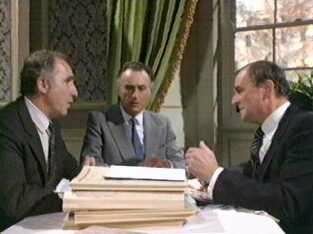 Jim Hacker and Sir Humphrey have lunch with the BBC Director of Policy. The BBC however does not give in to government pressure. Then Sir Humphrey produces a large number of files regarding unfavourable BBC reporting, jokes against the PM, and Minister's programme suggestions not accepted. Sir Humphrey informs the BBC Director that there is a lot of government criticism on the BBC, and questions are asked whether televised Parliament should be entrusted to ITV, and whether a Select Committee should scrutinize BBC expenditures. The BBC Director gets very nervous. Then Sir Humphrey tells him that the TV interview contained factual errors, out of date material and some security issues. The BBC Director now agrees that broadcasting is not in the public interest but he must point out that the BBC does not give in to government pressure.
Jim Hacker and Sir Humphrey have lunch with the BBC Director of Policy. The BBC however does not give in to government pressure. Then Sir Humphrey produces a large number of files regarding unfavourable BBC reporting, jokes against the PM, and Minister's programme suggestions not accepted. Sir Humphrey informs the BBC Director that there is a lot of government criticism on the BBC, and questions are asked whether televised Parliament should be entrusted to ITV, and whether a Select Committee should scrutinize BBC expenditures. The BBC Director gets very nervous. Then Sir Humphrey tells him that the TV interview contained factual errors, out of date material and some security issues. The BBC Director now agrees that broadcasting is not in the public interest but he must point out that the BBC does not give in to government pressure.
At the department Sir Humphrey brings Jim Hacker the happy news that the BBC decided not to broadcast his TV interview. Jim Hacker tells Sir Humphrey to hold of the pre-set failure standards plan for now. Sir Humphrey fully agrees.
Rating (0-10): 8
Top 5 Quotes:
 Jim Hacker: "But the broad strategy [in reforming local government] is to cut ruthlessly at waste while leaving essential services intact."
Jim Hacker: "But the broad strategy [in reforming local government] is to cut ruthlessly at waste while leaving essential services intact."
Ludovic Kennedy: "Well, that is what your predecessor said. Are you saying that he failed?"
Jim Hacker: "Please, let me finish, because we must be absolutely clear about this, and I would be quite frank with you, the plain fact of the matter is that at the end of the day it is the right, no the duty, of the elected government in the House of Commons to ensure that government policies, the policies on which we were elected and for which we have a mandate, the policies after all for which the people voted, are the policies which finally when the national cake has been divided up, and may I remind you we as a nation don't have unlimited wealth, so we can't pay ourselves more than we've earned, are the policies..... I'm sorry what was the question again?" Jim Hacker: "This government believes in reducing bureaucracy."
Jim Hacker: "This government believes in reducing bureaucracy."
Ludovic Kennedy: "Well, figures that I have here say that your department's staff has risen by 10%."
Jim Hacker: "Certainly not."
Ludovic Kennedy: "Well, what figure do you have?"
Jim Hacker: "I believe the figure is much more like 9.97."
[...]
Ludovic Kennedy: "How are you going to meet the challenge [in reforming local government]?"
Jim Hacker: "It is far to early to give detailed proposals, after all I have just come here direct from Number 10."
Ludovic Kennedy: "From Number 9.97, perhaps?" Sir Humphrey: "Well, we can always try to persuade them [the BBC] to withdraw programs voluntarily, once they realize that transmission is not in the public interest."
Sir Humphrey: "Well, we can always try to persuade them [the BBC] to withdraw programs voluntarily, once they realize that transmission is not in the public interest."
Jim Hacker: "Well, it is not in my interest. And I represent the public, so it is not in the public interest."
Sir Humphrey: "That's a novel argument. We haven't tried that on them before." Jim Hacker: "Half of them [local councilors] are self-centered busy-bodies on an ego-trip, and the other half are in it for what they can get out of it."
Jim Hacker: "Half of them [local councilors] are self-centered busy-bodies on an ego-trip, and the other half are in it for what they can get out of it."
Sir Humphrey: "Perhaps they ought to be in the House of Commons....I mean, to see how proper legislative assembly behaves." Jim Hacker: "But you got me this job [local government]."
Jim Hacker: "But you got me this job [local government]."
Sir Humphrey: "Yes, but I didn't expect you to do anything, I mean, you have never done anything before."
YM 3.3 - The Skeleton in the Cupboard
First airtime BBC: 25 November 1982
Length: 30 minutes
| Cast | Crew | |||
| Jim Hacker MP | Paul Eddington | Assistant floor manager | Lydia Frankenburg | |
| Sir Humphrey Appleby | Nigel Hawthorne | Studio lighting | John Dixon | |
| Bernard Woolley | Derek Fowlds | Costume designer | Judy Allen | |
| Peter (civil servant) | John Pennington | Make-up artist | Toni Chapman | |
| Civil Servant woman | Rosemary Williams | Senior Cameraman | Peter Ware | |
| Dr. Cartwright | Ian Lavender | Video tape editor | Bob Sutton | |
| Alex Andrews | Donald Gee | Vision mixer | Bill Morton | |
| Studio sound | Malcolm Johnson | |||
| Music | Ronnie Hazlehurst | |||
| Title sequence | Gerald Scarfe | |||
| Production assistant | Lesley Langan | |||
| Production manager | Brian Jones | |||
| Designer | Gary Pritchard | |||
| Producer | Peter Whitmore | |||
| Writers | Antony Jay & Jonathan Lynn | |||
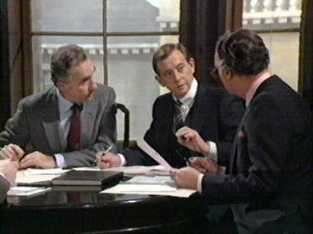 Plot: During a meeting with Jim Hacker, Sir Humphrey, Bernard and other officials, the proposed disciplinary action against South Derbyshire Council is discussed. Sir Humphrey wants to take strong action because this Council does not supply the DAA with all the information it requests. Jim Hacker however is not pleased with disciplining South Derbyshire because the Council is controlled by his Party and he sensed that Dr. Cartwright tried to tell him something during the meeting (but he was interrupted constantly by Sir Humphrey).
Plot: During a meeting with Jim Hacker, Sir Humphrey, Bernard and other officials, the proposed disciplinary action against South Derbyshire Council is discussed. Sir Humphrey wants to take strong action because this Council does not supply the DAA with all the information it requests. Jim Hacker however is not pleased with disciplining South Derbyshire because the Council is controlled by his Party and he sensed that Dr. Cartwright tried to tell him something during the meeting (but he was interrupted constantly by Sir Humphrey).
Jim Hacker decides to drop in on Dr. Cartwright, although Bernard strongly advises not to. As soon as Jim is on his way to Dr. Cartwright, Bernard informs Sir Humphrey that the Minister has gone walkabout, as it is called. Sir Humphrey is furious about this and also goes to Dr. Cartwright's office.
In Dr. Cartwright's office Jim learns that South Derbyshire is the most efficient local authority in Britain, and just not very interested in returning every blue form to Whitehall. Sir Humphrey suddenly enters the office and he more or less commands Jim Hacker back to his own office. There they have a heated argument. Sir Humphrey demands that 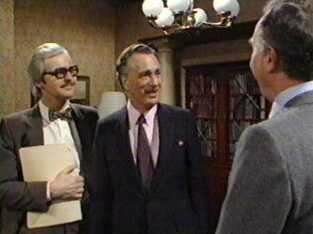 the Minister cannot have private conversations, because everything has to be always minuted to make sure he knows what is going on. Jim Hacker now announces that he does not want to discipline South Derbyshire. Sir Humphrey however points out that the Minister has no choice, it is the law.
the Minister cannot have private conversations, because everything has to be always minuted to make sure he knows what is going on. Jim Hacker now announces that he does not want to discipline South Derbyshire. Sir Humphrey however points out that the Minister has no choice, it is the law.
Next Alex Andrews from the Daily Mail comes to see Jim. He tells Jim about a story the Mail has uncovered that the government is giving away forty million pounds of equipment to a private developer. Due to an error by an official in the early 1950's, a Scottish island with military installations is now handed back to the original owner. Alex Andrews wants to make sure that the files that will be released shortly will be complete, because the Mail wants to find out who was responsible. That official could now for instance be a Permanent Secretary, responsible for spending billions of pounds of public money. Jim Hacker gives Alex the assurance that the complete file will be available. Alex Andrews points out that otherwise Jim Hacker will suffer severe negative publicity.
The next day, Sir Humphrey sees the article in the Daily Mail on the Scottish island scandal. His face all of sudden turns white. When at the DAA Jim Hacker tells him about the investigation the Mail is planning to find out who is responsible, Sir Humphrey is in a complete state of panic. He tries to convince Jim Hacker that releasing the files has security implications, but Jim Hacker is not convinced; the Mail can inspect the files as soon as they are publicly available.
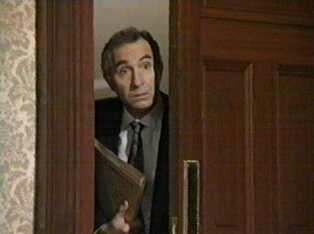 Jim cannot help wondering why Sir Humphrey is so anxious. Suddenly he begins to suspect who the responsible official for the Scottish island scandal is. Bernard finds out that in the 1950's Sir Humphrey was Assistant Principal at the Scottish Office, on secondment from the War Office as a Regional Contracts Officer. Jim Hacker now wants to see Sir Humphrey right away.
Jim cannot help wondering why Sir Humphrey is so anxious. Suddenly he begins to suspect who the responsible official for the Scottish island scandal is. Bernard finds out that in the 1950's Sir Humphrey was Assistant Principal at the Scottish Office, on secondment from the War Office as a Regional Contracts Officer. Jim Hacker now wants to see Sir Humphrey right away.
Jim Hacker asks Sir Humphrey to find out who was the responsible official. This information will surely be in the files, because everything is always minuted in the Civil Service. Finally, Sir Humphrey confesses that he was the official in question. Jim Hacker plays that he is shocked, and that he wants to help if he didn't have that other worry on his mind: being roasted by the press for disciplining South Derbyshire. Sir Humphrey now proposes to show leniency towards South Derbyshire Council. Jim Hacker is very pleased but only wants to know how he can explain the missing documents in the file. Then Sir Humphrey hands over a statement to be included with the file. When Jim Hacker wants to know how much they usually will be left to see after this statement, it turns out to be zero documents.
Rating (0-10): 9½
Top 5 Quotes:
 Jim Hacker: "Bernard, how did Sir Humphrey know I was with Dr. Cartwright?"
Jim Hacker: "Bernard, how did Sir Humphrey know I was with Dr. Cartwright?"
Bernard Woolley: "God moves in a mysterious way."
Jim Hacker: "Let me make one thing perfectly clear: Humphrey is not God, okay."
Bernard Woolley: "Will you tell him or shall I?"
Jim Hacker: "Tell me how he knew where I was."
Bernard Woolley: "Well, confidentially Minister, everything you tell me is in complete confidence, so equally, and I am sure you appreciate this, and by appreciate I don't actually mean appreciate, I mean understand, that everything Sir Humphrey tells me is also in complete confidence, as indeed everything I tell you is in complete confidence, and for that matter everything I tell Sir Humphrey is in complete confidence."
Jim Hacker: "So?"
Bernard Woolley: "So in complete confidence, I am confident that you understand that for me to keep Sir Humphrey's confidence and your confidence, means that conversations between him and me must be completely confidential, as confidential in fact as conversations between you and me are completely confidential." Sir Humphrey: "Minister, I think there is something you perhaps ought to know."
Sir Humphrey: "Minister, I think there is something you perhaps ought to know."
Jim Hacker: "Yes Humphrey?"
Sir Humphrey: "The identity of the Official whose alleged responsibility for this hypothetical oversight has been the subject of recent discussion, is NOT shrouded in quite such impenetrable obscurity as certain previous disclosures may have led you to assume, but not to put too fine a point on it, the individual in question is, it may surprise you to learn, one whom you present interlocutor is in the habit of defining by means of the perpendicular pronoun."
Jim Hacker: "I beg your pardon?"
Sir Humphrey: "It was...I." Sir Humphrey: "But if they don't send us the information and the plans and the requests for permission, well, what are we here for?"
Sir Humphrey: "But if they don't send us the information and the plans and the requests for permission, well, what are we here for?"
Jim Hacker: "Good question. What are we here for?"
Sir Humphrey: "To collect the information, inspect the plans and withhold or grant permission."
Jim Hacker: "And if we didn't?"
Sir Humphrey: "I'm sorry, Minister. I don't understand."
Jim Hacker: "If we weren't here and we didn't do it, what then?"
Sir Humphrey: "I'm sorry, Minister. You've lost me."
Jim Hacker: "You know, your trouble is that you're more concerned with means than ends."
Sir Humphrey: "There are no ends in administration, Minister, except loose ends. Administration is eternal."
Bernard Woolley: "Forever and ever..."
Bernard & Sir Humphrey: "...amen." Jim Hacker: "Dr. Cartwright seemed to be trying to tell me something. I think I'll drop in on him."
Jim Hacker: "Dr. Cartwright seemed to be trying to tell me something. I think I'll drop in on him."
Bernard Woolley: "Oh no no, I wouldn't so that, Minister."
Jim Hacker: "Why not?"
Bernard Woolley: "Well it is understood if Ministers want to know anything it will be brought to their notice. If they go out looking for information they might...oh well, they might..."
Jim Hacker: "..find it?" Sir Humphrey: "If local authorities don't send us the statistics that we ask for, than government figures will be a nonsense."
Sir Humphrey: "If local authorities don't send us the statistics that we ask for, than government figures will be a nonsense."
Jim Hacker: "Why?"
Sir Humphrey: "They will be incomplete."
Jim Hacker: "But government figures are a nonsense anyway."
Bernard Woolley: "I think Sir Humphrey want to ensure they are a complete nonsense."
